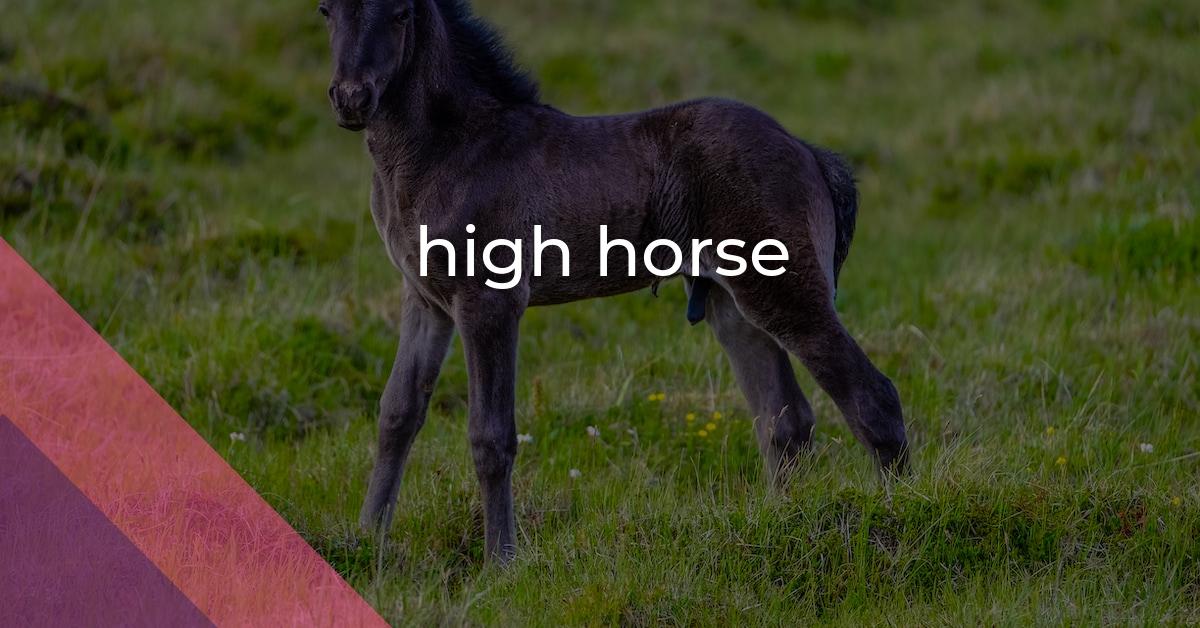high horse: Idiom Meaning and Origin
What does ‘high horse’ mean?
"High horse" is an idiom that means someone is being arrogant, self-righteous, or condescending. It is often used to criticize someone who acts superior or looks down on others.

Idiom Explorer
The idiom "on one's high horse" means to be arrogant or haughty, often by behaving in a superior or condescending manner.
Jumped-up refers to someone who is arrogant or conceited, often due to suddenly acquiring a higher social or professional status. This idiom describes individuals who overestimate their importance and exhibit an inflated sense of self-importance.
The idiom "horse's ass" refers to someone who is foolish, incompetent, or makes a fool of themselves. It is often used to criticize someone's behavior or actions, implying that they are behaving stupidly or in a ridiculous manner.
The idiom "high ground" refers to a position of advantage or superiority in a conflict or competition, both literally and figuratively. It suggests being in a better position, having more power or control, or having more favorable circumstances than others.
The idiom "higher than a kite" means being under the influence of drugs or alcohol and feeling extremely intoxicated or euphoric.
The idiom "high and mighty" means that someone is arrogant, haughty, or acting superior to others. It refers to someone who thinks they are better or more important than everyone else.
"High and dry" is an idiom that means to be left in a difficult or helpless situation, especially without any assistance or support.
The idiom "grass tops" refers to the highest level or upper echelons of a particular group or organization, typically consisting of influential or powerful individuals. It symbolizes the idea of reaching the top or pinnacle of success within a specific field or domain.
The idiomatic expression "go to someone's head" means that success or praise can make a person arrogant or overconfident, leading them to have an inflated sense of importance or superiority.
The idiom "gift horse" refers to a situation where one should not question or criticize a gift, as it is impolite to do so. One should accept the gift graciously without looking for faults or flaws.
Decoding Equine Elevation
The idiom "high horse" is commonly used in English to describe someone who is arrogant, self-righteous, or overly proud. This phrase can be observed in different contexts, including conversations, literature, and media. It often carries a negative connotation, reflecting disapproval or criticism of those who exhibit an inflated sense of superiority.
The origins of the idiom "high horse" can be traced back to medieval times. During this period, riding a horse was associated with power, authority, and nobility. Horses were highly valued and were often used by knights and nobles to display their status and dominance. Riding a horse at a higher height than others was considered a position of privilege, symbolizing superiority and prestige. Over time, this association between horses and superiority became embedded in the English language and manifested in the idiom "high horse."
In modern usage, the idiom "high horse" is often used to criticize individuals who adopt a condescending attitude or express an inflated sense of self-importance. It suggests that these individuals metaphorically sit upon a figurative high horse, looking down on others and belittling their opinions or actions. It serves as a reminder to remain humble and considerate, rather than assuming an air of superiority.
The idiom "high horse" is frequently used in informal settings as a means of expressing disapproval or calling out arrogance. It can be employed to challenge or dismiss someone who is perceived to be acting holier-than-thou or with an exaggerated sense of moral superiority. By invoking the idiom, individuals aim to highlight the hypocrisy or self-righteousness of those on their "high horse" and encourage a more egalitarian and empathetic approach.
However, it is important to note that the idiom "high horse" is not limited to negative connotations. In certain contexts, it can also be used humorously or playfully, without necessarily implying contempt. The phrase can be utilized to gently tease someone who may be taking themselves too seriously or to inject a lighthearted tone into a conversation. It can also serve as a reminder to individuals to maintain perspective and not allow themselves to become overly self-assured or dismissive of others.
The idiom "high horse" has firmly established itself in the English language as a versatile figure of speech, capable of conveying various shades of meaning. Its origins in medieval imagery and its continued usage in contemporary discourse attest to its enduring relevance. Through its evocative imagery, the phrase offers a poignant critique of human nature's propensity towards arrogance and the importance of humility in our interactions.
The idiom "on one's high horse" is closely related to the phrase "high horse." It is used to describe someone who is behaving in an arrogant or self-righteous manner, often showing a sense of superiority over others. When a person is "on their high horse," their behavior usually reflects a belief that they are above others in some way. This idiom can be seen as an extension of the original phrase "high horse," emphasizing the specific behavior of acting superior or looking down on others.
Similarly, the idiom "high and mighty" is closely related to the concept of being on a "high horse." It refers to someone who has an exaggerated sense of their own importance or superiority. The phrase suggests that this person believes themselves to be above others and acts accordingly. It conveys a negative judgment on the individual's attitude and behavior, highlighting a lack of humility and empathy. The idiom "high and mighty" can be seen as a more explicit and critical version of the behavior associated with being "on one's high horse."
On the other hand, the idiom "get off one's high horse" is used to encourage someone to stop behaving arrogantly or condescendingly. It implies that the person should come down from their metaphorical "high horse" and adopt a more humble and considerate attitude. This idiom suggests that the individual has been exhibiting behavior that is perceived as superior or dismissive, and it serves as a call to change that behavior. It encourages self-reflection and the recognition of one's own faults or shortcomings.
The idiom "high horse" is a versatile phrase in the English language, used to describe someone who is arrogant, self-righteous, or overly proud. It originated from the association between riding a horse and power in medieval times. The idiom can be employed to criticize individuals who exhibit an inflated sense of superiority, with related idioms such as "on one's high horse," "high and mighty," and "get off one's high horse" further emphasizing specific aspects of this behavior. While the idiom often carries a negative connotation, it can also be used humorously or playfully. Overall, the phrase serves as a reminder of the importance of humility and empathy in our interactions with others.
Example usage
Examples of how the idiom "high horse" can be used in a sentence:
- After winning the debate, John was on his high horse and couldn't help but boast about his intelligence.
- Emma needs to get off her high horse and realize that she is not the only one with good ideas.
- Don't expect Sarah to admit she made a mistake, she's always on her high horse and never takes responsibility for her actions.
More "Transportation" idioms



